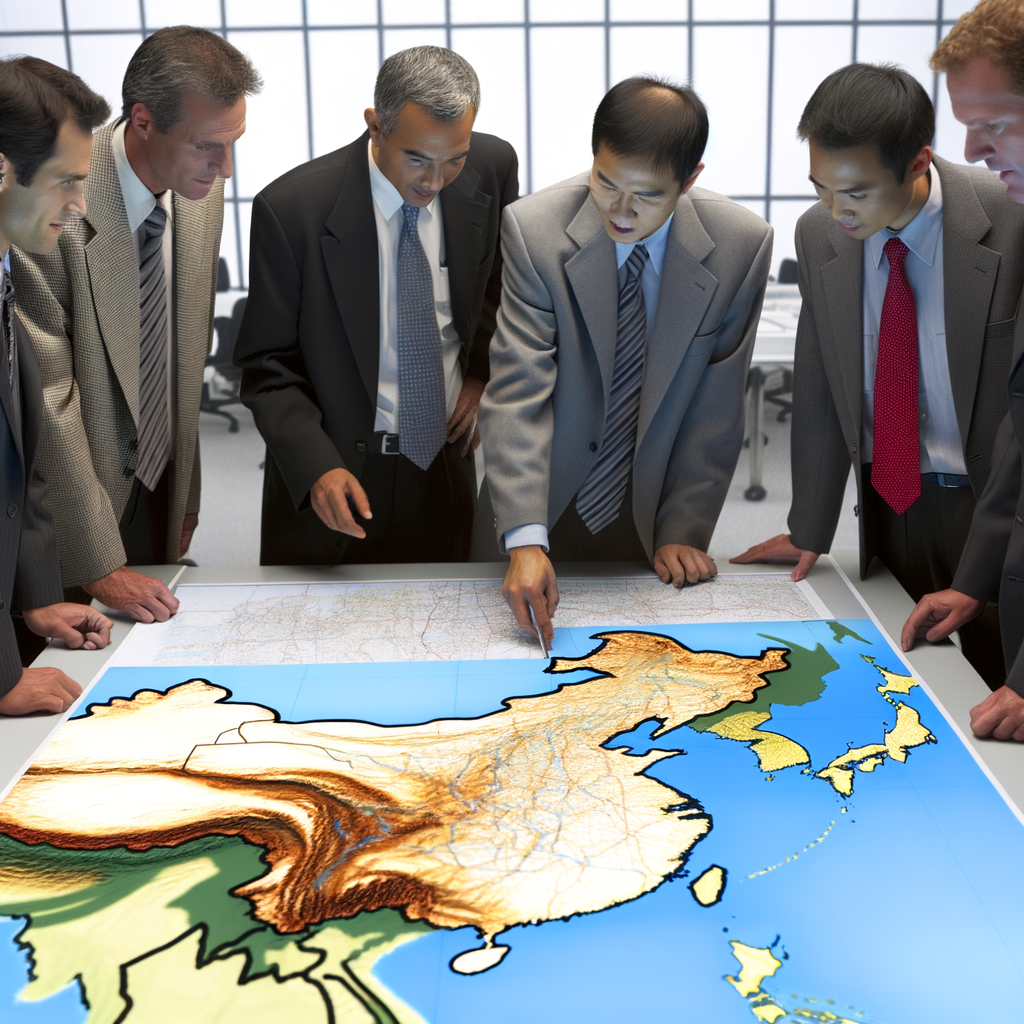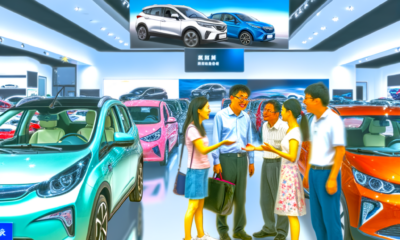
Guangzhou Mobilizes Hukou Residency System Reform to Revive Home Sales Amidst Nationwide Housing Slump
Guangzhou plans to modify the 'hukou' residency structure in a significant effort to boost housing sales. The city, which is the capital of the Guangdong province in the south, is burdened with 13.2 million square meters of unsold residences, a situation that would take nearly two years to rectify.
Guangzhou is set to implement fresh initiatives that will allow prospective homeowners to acquire local residency, outpacing competing major Chinese cities in adjusting the household registration process to boost property sales. This comes in the wake of the central government's efforts to salvage the real estate market.
Individuals who have purchased properties in any of the seven city divisions – Baiyun, Huangpu, Huadu, Panyu, Nansha, Conghua, and Zengcheng – and have made social insurance payments for a year, can qualify to request for hukou or formal residency, as per the city's local authorities.
People who have contributed a minimum of 200,000 yuan (US$27,650) in income tax in Guangzhou for the last three straight years are now eligible to apply for a hukou, as per the latest proposals released late on Monday.
"Chen Xueqiang, an analyst at China Index Academy, suggests that these incentives will stimulate demand to a certain degree. He also notes that easing hukou regulations could entice and keep skilled individuals in the city, which could eventually lead to a surge in demand for housing."
The leading 30 property developers in Guangzhou experienced a 13% reduction in new home sales in the first ten months compared to the same period last year, as reported by China Real Estate Information Corp. This decline reflects the nationwide decrease in housing sales. Based on data from the China Index Academy, the city holds 13.2 million square meters of unsold properties, which, considering the current demand, could take around 22 months to sell.
Business
DeepSeek Ignites AI Revolution: Leading Chinese Tech Giants Lenovo, UBTech, and Geely Adopt Cutting-edge Tech Amidst US Sanctions

Technology Battle: DeepSeek initiates AI implementation in PCs, robots, and electric vehicles in response to US restrictions
Among the significant Chinese tech manufacturers incorporating DeepSeek technology are the PC titan Lenovo, robotics company UBTech, and electric vehicle producer Geely.
The initiatives highlight the extent to which DeepSeek has gained recognition in the domestic and international tech industry, due to its latest AI innovation.
Lenovo launched Xiaotian early in the previous year, with plans to incorporate it more broadly into their tablets, smartphones, and other devices. Its main function is to automate tasks such as condensing or converting documents into different languages, as well as recording the details of a meeting.
Business
Budget-Conscious, Middle-Income Consumers in China Favor Cheaper Geely, Xpeng EV Models Over Market Leaders: An Emerging Threat to Tesla

Geely and Xpeng electric vehicle models challenge dominant market players with more affordable, smarter cars. China's middle-income customers are becoming more mindful of their spending.
Two affordable electric vehicle (EV) models aimed at middle-class consumers in mainland China have surfaced as Tesla's main competitors, with purchasers becoming more cost-aware.
Younger consumers with moderate income are drawn to electric vehicles that boast advanced features such as self-driving systems and voice-activated controls. However, due to economic uncertainties and their own job stability, they typically opt for the most affordable options, according to Eric Han, a high-ranking official at Suolei, a consulting company based in Shanghai. Vehicles such as the Galaxy and Mona are considered to provide good value for the money, offering performance that matches some high-end models.
The Mona 03, an intermediate, wholly electric four-door car ranging in price from 119,800 yuan to 159,800 yuan, launched in mainland China in August, disclosed sales of over 15,000 vehicles in January.
The mainland Electric Vehicle (EV) market recorded approximately 900,000 unit sales in January, reflecting a 31% increase compared to the same month last year, as per data from the China Passenger Car Association (CPCA).
The Mona 03, furnished with a high-tech driver-assistance system, can travel at least 515km on a single charge. It's viewed by a lot of young drivers as a comparable option to Tesla's Model 3 produced in Shanghai, which costs 227,500 yuan for its most basic model.
Tian Maowei, a sales manager at Yiyou Auto Service in Shanghai, stated that a buyer could save 50% on the cost if they choose to purchase a Mona 03 over a Model 3, despite both cars being similar in size, driving range and "smart" features. Maowei also noted a growing trend of customers selecting the most affordable brand and model due to concerns about job stability and possible salary reductions, as they anticipate economic instability in the future.
Business
DeepSeek’s Disruptive AI Innovation: How a Chinese Start-Up’s Quantum Trading Shook Western Markets and Redefined China’s Tech Narrative

The AI startup DeepSeek has disrupted industry beliefs and reshaped China's story. The distinctive AI designs from a startup that emerged from a hedge fund have shaken up Western markets and are altering China's perception of its place in the sector.
On January 28 of the same year, Liang's hedge fund, High-Flyer Quant, publicly announced that its quantum trading was not to blame for the downturn in Chinese stocks.
Lately, there's been chatter suggesting that a collective unloading of shares by algorithmic trading entities caused a market slump," stated High-flyer. "We've conversed with the heads of the key firms in the sector and they've all refuted this claim. Please disregard these rumors, thank you."
Three years down the line, DeepSeek, a subsidiary of High-Flyer, came into the limelight for causing turmoil in the American stock market. On January 27, an enormous sell-off eradicated close to a trillion US dollars in technology stocks, with Nvidia bearing the brunt and losing $600 billion alone.
The trigger was the launch of DeepSeek's R1 reasoning model, arriving only a few weeks following the revelation of the conventional V3 large language model (LLM). These models contested the effectiveness of OpenAI's products at a significantly lower cost, thereby questioning the presumptions that support the inflated worth of American chip and AI firms.
Business
From Buzz to Bust: TikTok’s Crystal Craze and the Crumbling of China’s Crystal Capital

Unfortunate times: The global slump dulls China's crystal trade
'Healing' crystals are creating a massive stir on TikTok, yet Chinese traders affirm that foreign clients are progressively unable to purchase.
Crystals – sparkling gems thought to possess therapeutic qualities and luck-enhancing vibrations – are fascinating customers globally.
On TikTok, the tag #crystal has garnered over 1.5 million video submissions, with several receiving several hundred thousand approvals. Prominent figures like Adele and Kim Kardashian have publicly discussed the alleged therapeutic properties of crystals.
The trend has significantly impacted Donghai – a modest county in the eastern Jiangsu region, famously referred to as "China's crystal hub".
The area has evolved into a center for the production and distribution of rock crystals, with about 25% of its 1.24 million inhabitants employed in industries connected to crystals.
The crystal sector in Donghai has experienced a tremendous surge in sales over the past few years. Official figures indicate that revenues almost doubled, soaring from 24 billion yuan (equivalent to US$3.3 billion) in 2020 to 46 billion yuan in the following year.
However, numerous local enterprises on the ground level believe the industry is losing its luster.
Business
US Should Retain China’s Integration in Aviation to Maintain Advantage, Despite Biotech Threats: Advisory Panel Expert

The US can maintain its advantage over China's aviation sector by continuing to collaborate with it, according to an expert from an advisory panel. The panel also received serious alerts regarding China's progress in biotechnology during the hearing.
An expert suggested to a US government advisory committee on Thursday that America should continue to involve China in its aviation industry supply chains to retain influence over the nation's developmental capabilities.
For numerous years, American authorities have claimed that MIC-2025 employs unjust trading methods to contest US dominance in technology. They have cited this as a reason for implementing import tariffs and other commerce and investment limitations with China.
The USCC, accountable to Congress, utilizes the insights from specialists to shape policies aimed at neutralizing China's potential to jeopardize US interests.
Richard Aboulafia, an aviation expert and head of AeroDynamic Advisory, suggested that the United States should avoid a defensive attitude and continue to encourage global cooperation in the aviation manufacturing sector.
Three forty-four
China's domestically-produced passenger plane C919 marks the first year since its inaugural flight.
He highlighted the difficulties China has faced in creating jet engines for commercial planes and cautioned that excluding China from supply chains might have the unintended consequence of speeding up its drive towards self-reliance.
Business
Chinese Companies Caught in Trump Policy Whirlwind: Navigating Unpredictability and Emerging Challenges in US Market

Chinese companies, caught in the whirlwind of Trump's policies, find it challenging to maintain stability. The swift declarations – and retractions – of fresh initiatives by the new US government have left Chinese exporters disoriented.
One hour and forty
The US Postal Service has halted the receipt of packages from Hong Kong and mainland China.
Unforeseen policy announcements and occasional abrupt U-turns by US President Donald Trump have become an unavoidable factor of risk assessment for Chinese businesses connected to the American market, impacting everything from import duties to parcel deliveries.
Given the uncertainty characteristic of the current US president's reign, Chinese export businesses and international online retailers must stay vigilant. Fast-paced shifts in global politics could result in unexpected cost increases.
David Wang, a baking tools producer based in Yiwu, Zhejiang province, has indicated his intentions to create new products following the Lunar New Year. He intends to market these products in the US via online retail platforms.
"However, considering the present circumstances, it appears more prudent to postpone those plans for the time being," he commented, alluding to the halt in delivery.
He mentioned that if a subsequent suspension is declared, numerous international online commerce companies will face difficulties.
Business
Shanghai Targets Auto Industry Dominance with Toyota’s 100,000-Unit EV Plant: A Leap Towards Lexus-Branded EV Production by 2027

Shanghai is striving to regain its status as China's top automobile manufacturer with a Toyota factory capable of producing 100,000 units. The Japanese auto manufacturer intends to utilize the local resources, supply chain, logistics infrastructure, and skilled workforce to manufacture Lexus-branded electric vehicles starting from 2027.
Shanghai is making significant progress toward regaining its status as the nation's top automobile manufacturing center, following Toyota Motor's intention to commence car production in the city.
The Shanghai Commerce Commission stated that Toyota's financial commitment clearly displays China's appeal to overseas investors. They pledged to assist businesses in resolving issues and offer effective, pertinent services to the majority of foreign firms looking to invest and develop in Shanghai.
In a distinct announcement, the Japanese auto manufacturer revealed that the factory, which can produce up to 100,000 vehicles per year, will utilize the regional supply chain, logistics network, and labor force to manufacture Lexus-branded electric vehicles.
One hour and fifty
Trial run of electric flying car conducted in northern China
Gao Shen, an independent analyst, stated that Shanghai authorities have a cause for celebration as they've successfully attracted Toyota to set up a car manufacturing plant in the city. He highlighted that the automobile sector is a crucial part of the city's economic structure, and Toyota, being the leading automobile manufacturer globally, is undoubtedly one of the few major corporations that the city's officials have aimed to attract.
Business
Pop Mart’s Toy Boom: From Labubu to Ne Zha, a Market-Beating Stock Rally Predicted by Morgan Stanley

Pop Mart's stock rally outperforms the market, driven by the popularity of toys from Labubu to Ne Zha. Morgan Stanley has identified the Chinese toy manufacturer as a top choice, forecasting a significant improvement in their earnings this year due to robust sales.
Following its triumph with Labubu, Pop Mart International is experiencing another surge in intellectual property (IP) merchandising, with its toys inspired by China's top-earning Ne Zha 2 being rapidly purchased by consumers. This has led the prominent US investment bank, Morgan Stanley, to highlight the stock as one of its premier choices.
The Ne Zha toys from Pop Mart were completely bought up just days after being launched on January 30. This happened concurrently with the animation setting new local box office records, as reported by the state-run China Movie Database on Thursday. The follow-up also surpassed The Battle at Lake Changjin in terms of total ticket sales, after an impressive performance during the Lunar New Year holiday.
Morgan Stanley analysts, such as Dustin Wei and Carol Xia, anticipate that Pop Mart will evolve into a primary collaborator for worldwide IP owners who aim to generate profit and boost the fame of their IP through IP toys. They further emphasized that the company's success accentuates its sway in the IP strategy.
Analysts stated that while third-party Intellectual Properties such as Ne Zha constituted only 15 to 20 percent of Pop Mart's earnings, they were instrumental in successfully attracting new clientele for the brand.
Business
China’s ‘Sputnik Moment’: DeepSeek’s AI Dominance Stirs Global Market, Says Deutsche Bank

"China dominates globally" is the message as DeepSeek demonstrates its power in high-value industries, according to Deutsche Bank. DeepSeek's rise represents a pivotal moment, not just for Artificial Intelligence, but also for China, as it outperforms the rest of the world, says the bank. The emergence of DeepSeek is indeed a turning point not only for AI, but also for China, which is excelling beyond global competition, the bank reiterates.
The unveiling of DeepSeek has shaken the global conviction that they "could restrain China," as expressed by Deutsche Bank. They referred to the introduction of the artificial intelligence (AI) technology as China's "Sputnik moment".
The bank is describing the success of the start-up as a major milestone for the nation, presenting a perspective that exceeds that of Marc Andreessen, a prominent venture capitalist based in Silicon Valley. Andreessen likened DeepSeek's progress to the AI industry's equivalent of the Sputnik moment. These remarks are a nod to the time when the Soviet Union launched the first-ever artificial satellite in 1957, immediately altering the world's view of the nation.
According to a report titled "China Eats the World" by Deutsche Bank on Wednesday, it is projected that by 2025, the global investment community will recognize China's dominance over its global competitors, as reported by the Post.
The bank had always been positive about Chinese corporations, though it was unsure about the exact catalyst that would spark a worldwide interest in them, until this moment, according to its statement. "We're of the opinion that the upward trend in the market for stocks in Hong Kong and China kicked off in 2024, and it's set to surpass previous records in the foreseeable future," stated the report, penned by Peter Milliken, who heads the Asia-Pacific corporate research division at the bank, based in Hong Kong.
The bank reported that China's hold over high-profit sectors was growing at an unparalleled rate. As companies at the forefront globally continue to increase their market share in various sectors, it's expected that China's contribution to global market value will soon exceed single-digit percentages.
The sudden popularity of DeepSeek has sparked a surge in Chinese tech stocks and instigated a drop in firms listed on Nasdaq. The Hang Seng Tech Index, spearheaded by leading corporations like Tencent Holdings, Alibaba Group Holding, and Xiaomi, neared a four-month peak on Thursday after a more than 10 per cent upswing in the last two weeks. The wider Hang Seng Index also experienced a roughly 6 per cent increase. Shares of DeepSeek, established in the Zhejiang province's capital, Hangzhou, by Liang Wenfeng in 2023, are not available on the public market.
Business
Hong Kong Stocks Soar to Four-Month Peak Amid Tech Optimism, Investors Await US Jobs Data for Interest-Rate Insights

Stocks in Hong Kong have seen a rise due to positive sentiment in the tech sector, marking the highest weekly increase since October. The Hang Seng Index is nearing its October height, even as some investors are waiting for employment data from the US to guide them on decisions about interest rates.
Hong Kong shares rose following increases in tech firms, driving the city's key index to its best weekly performance in four months. This rise occurred despite some investors scaling back their stakes ahead of a US employment report, which may provide insights into future interest rate trends.
The Hang Seng Index increased by 1.2% ending at 21,133.54 when trading closed on Friday, and the Tech Index also saw a rise of 1.8%. Both indices saw a significant rise from the previous week, with increases of 4.5% and 9% respectively. Over in mainland China, the CSI 300 Index experienced a 1.3% rise, while the Shanghai Composite Index went up by 1%.
Lenovo Group saw a significant increase of 6.3 per cent, reaching HK$12.22, while Xiaomi experienced a 4.7 per cent jump to HK$42.45, following their announcement of a new electric vehicle (EV) and a range of new phones. HSBC adjusted Xiaomi's price target upwards to HK$49.90 from HK$37.90, citing it as the major recipient of China's subsidy scheme.
Huatai Securities has increased the price target for PC manufacturer Lenovo from HK$13.30 to HK$13.85. This change is due to the anticipated rise in demand for PC capabilities, largely due to DeepSeek's efforts to make artificial intelligence (AI) more easily available to the public.
"Tech shares have seen a notable increase in recent weeks and are expected to keep climbing due to an influx of capital," stated Kenny Wen, the chief of investment strategy at KGI Asia. The rise in Chinese stocks has not yet capitalized on the improvement in their long-term foundational aspects, he further mentioned.
Electric vehicle producer Geely Automobile saw a 8.1 per cent increase in its stock value to HK$17.72, leading the way in industry growth. Li Auto also experienced a significant growth of 7.6 per cent, bringing its stock value to HK$103.20, while BYD also saw a 4.5 per cent rise to HK$330. Additionally, solar panel manufacturer Xinyi Solar's stock value went up by 7.8 per cent to HK$3.59.
Business
Hong Kong: The Rising Global Epicentre for Family Offices and Wealth Management

Hong Kong: A global hub for family offices
Being a top-tier international finance hub, Hong Kong is cementing its role as the go-to place for setting up family offices.
Hong Kong, being a leading global financial hub in Asia, offers a perfect setting for family offices and investors who are interested in capitalizing on investment prospects in mainland China, the Asia-Pacific region and worldwide markets.
Over 2,700 single-family offices are currently functioning, as per a recent market analysis by Deloitte, making Hong Kong a prime location for managing wealth and diversifying investments. A significant advantage in Hong Kong is that these single-family offices don't need to obtain licenses to operate, thereby simplifying their operations by avoiding intricate regulatory systems.
"Hong Kong has positioned itself as a top choice for family offices, providing a mix of regulatory benefits, financial facilities, and worldwide links," states Cameron Harvey, the chief executive of Landmark Family Office, highlighting the elements that the office took into account before setting up its international headquarters in the metropolis. Key factors that swayed Landmark's choice included Hong Kong's diverse financial product offering, specialist consulting services, and adaptable investment options.
Beneficial environment
These services and benefits, integral to the city's emerging ecosystem, aid in the complex handling of assets, making certain that family offices can smoothly operate in both local and global markets and safeguard their financial heritage for future generations. "Together, these elements improve investment opportunities, assisting in the expansion and maintenance of wealth," says Harvey.
Over 70 of the globe's 100 leading banks are headquartered in Hong Kong. The city also boasts a wealth of skilled financial experts who provide services in areas such as accounting, insurance, global tax matters, wealth guidance, and investment consultation.
Landmark also conveyed their trust in Hong Kong's strong legal and regulatory structure, as well as its autonomous judiciary, which is a significant factor for extremely wealthy individuals residing in other parts of Asia.
Business
HSBC Mulls CEO Pay Restructure Following UK’s Bonus Cap Repeal: Elhedery’s Fixed Salary Could Halve, Bonuses Skyrocket

HSBC is contemplating a revamp of the CEO's remuneration structure as UK banks abandon bonus limits. The current proposal would significantly reduce CEO Elhedery's base salary, but his possible bonus could increase substantially, according to someone with knowledge of the matter.
HSBC Holdings is contemplating reducing the base salary of its new CEO, Georges Elhedery, by 50%. This comes after the UK adjusted its regulations, permitting a larger portion of compensation to be derived from performance-based bonuses.
At present, Elhedery earns a basic wage of £1.38 million (HK$13.3 million), supplemented by a fixed compensation worth £1.7 million. Additionally, he is eligible for a yearly bonus of up to 215% of his base wage and a long-term prize potentially amounting to 320% of his wage. Coupled with a pension allowance, his total package can reach up to approximately £10.6 million annually.
The bank based in London might offer Elhedery a deal valued up to £15 million as part of a new scheme currently under consideration, according to an anonymous source close to the matter who requested anonymity prior to any official statement. Sky News was the first to reveal specifics of the new incentives. Although his base salary would possibly be cut by about 50%, his potential bonus could significantly increase, the source mentioned.
"Although no final choices have been made, the compensation committee's goal is to ensure that the pay results for our executive directors are closely tied to performance and the interests of our shareholders," stated a spokesperson for HSBC.
The financial institution is set to release information about the reimbursement in conjunction with its annual financial report on February 19, as per the announcement. HSBC is currently undergoing a widespread restructuring, resulting in the departure of numerous senior leaders and the gradual cessation of some of its investment banking activities in Europe and the Americas.
Previously, the UK had essentially restricted banking bonus payouts to double the basic wage, following European Union limits initially put in place in 2014 due to public backlash from the worldwide financial crisis. However, towards the end of 2023, British authorities lifted these restrictions as part of a wider effort to enhance the appeal of post-Brexit Britain as a financial hub.
Numerous other financial institutions in the UK, such as Barclays, Goldman Sachs, and JPMorgan Chase, have been eliminating those constraints and revamping top-level salaries following the modifications to the rules.
-

 AI4 months ago
AI4 months agoNews Giants Wage Legal Battle Against AI Startup Perplexity for ‘Hallucinating’ Fake News Content
-

 Tech2 months ago
Tech2 months agoRevving Up the Future: How Top Automotive Technology Innovations Are Paving the Way for Sustainability and Safety on the Road
-

 Tech2 months ago
Tech2 months agoRevving Up Innovation: How Top Automotive Technology is Driving Us Towards a Sustainable and Connected Future
-

 Tech2 months ago
Tech2 months agoDriving into the Future: Top Automotive Technology Innovations Transforming Vehicles and Road Safety
-

 Tech2 months ago
Tech2 months agoRevolutionizing the Road: Top Automotive Technology Innovations Fueling Electric Mobility and Autonomous Driving
-

 Tech2 months ago
Tech2 months agoRevving Up the Future: How Top Automotive Technology Innovations Are Paving the Way for Electric Mobility and Self-Driving Cars
-

 Tech2 months ago
Tech2 months agoRevolutionizing the Road: How Top Automotive Technology Innovations are Driving Us Towards an Electric, Autonomous, and Connected Future
-

 Formel E2 months ago
Formel E2 months agoStrafenkatalog beim Sao Paulo E-Prix: Ein Überblick über alle technischen Vergehen und deren Konsequenzen












































